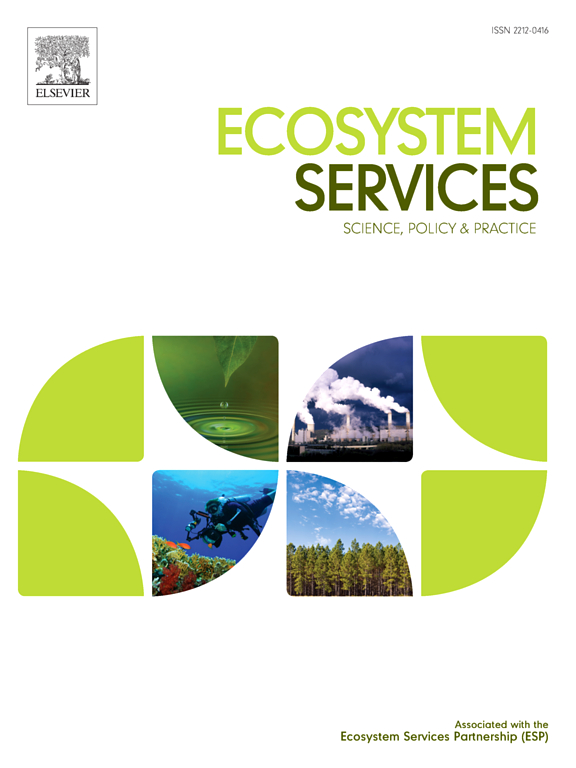冰冻圈生态系统服务、危害和相关指标的范围审查
IF 6.6
2区 环境科学与生态学
Q1 ECOLOGY
引用次数: 0
摘要
冰冻圈是指地球表面水以固体形式存在的部分,通过提供重要的生态系统服务,对人类福祉作出了重大贡献。其中包括地下水补给、水储存和净化、气候调节以及各种文化和精神效益。系统的生态系统服务分类可用于定义、测量和评估冰冻圈对社会的贡献方式,并以清晰、透明和科学合理的方式传达这些益处,然而,迄今为止还缺乏这种分类。这项研究建立在先前的文献基础上,探讨了在快速气候变化的背景下冰冻圈对人类福祉的积极和消极影响。它进一步在全球范围内组织这些知识,以期加强科学探索和政策指导,同时促进不同研究之间的可比性。我们的研究采用搜索-评估-综合-分析(SALSA)文献综述方法和国际生态系统服务共同分类(CICES)来获取和系统化冰冻圈提供的生态系统服务和危害的现有信息,并确定了监测其变化的可能指标。共确定了30种生态系统服务和10种有害服务,以及可用于监测其生物物理、经济和社会文化趋势的指标。我们的研究发现,尽管冰川和其他冰冻圈成分加速退缩,但由于全球气候变化,生态系统的危害也在增加,冰冻圈继续提供重要的生态系统服务。监测冰冻圈对人类福祉贡献的趋势有可能为快速变化的冰冻圈环境中的适应性治理提供信息。本文章由计算机程序翻译,如有差异,请以英文原文为准。
A scoping review of the Cryosphere’s ecosystem services, disservices, and related indicators
The cryosphere, which refers to the parts of the Earth’s surface where water is in solid form, is a major contributor to human wellbeing through the provision of vital ecosystem services. These include, e.g., groundwater recharge, water storage and purification, climate regulation, and diverse cultural and spiritual benefits. A systematized classification of ecosystem services can be used to define, measure, and value the ways in which the cryosphere contributes to society and to communicate these benefits in a clear, transparent and scientifically sound way, yet, it has been missing to date. This study builds on previous literature exploring the cryosphere’s positive and negative impacts on human wellbeing in the context of rapid climate change. It further organises this knowledge on a global scale with a view to enhancing scientific exploration and policy guidance, along with facilitating comparability between different studies. Our research applies the Search-Appraisal-Synthesis-Analysis (SALSA) literature review method and the Common International Classification of Ecosystem Services (CICES) to source and systemise the existing information on ecosystem services and disservices provided by the cryosphere, and possible indicators for monitoring their changes are identified. A total of 30 ecosystem services and 10 disservices were identified, together with indicators that could be used to monitor their trends in biophysical, economic, and sociocultural terms. Our research finds that the cryosphere continues to provide vital ecosystem services despite accelerated retreat of glaciers and other cryospheric components, but also an increasing amount of ecosystem disservices because of global climate change. Monitoring trends in the cryosphere’s contributions to human wellbeing has the potential to inform adaptive governance in fast-changing cryospheric environments.
求助全文
通过发布文献求助,成功后即可免费获取论文全文。
去求助
来源期刊

Ecosystem Services
ECOLOGYENVIRONMENTAL SCIENCES&-ENVIRONMENTAL SCIENCES
CiteScore
14.90
自引率
7.90%
发文量
109
期刊介绍:
Ecosystem Services is an international, interdisciplinary journal that is associated with the Ecosystem Services Partnership (ESP). The journal is dedicated to exploring the science, policy, and practice related to ecosystem services, which are the various ways in which ecosystems contribute to human well-being, both directly and indirectly.
Ecosystem Services contributes to the broader goal of ensuring that the benefits of ecosystems are recognized, valued, and sustainably managed for the well-being of current and future generations. The journal serves as a platform for scholars, practitioners, policymakers, and other stakeholders to share their findings and insights, fostering collaboration and innovation in the field of ecosystem services.
 求助内容:
求助内容: 应助结果提醒方式:
应助结果提醒方式:


